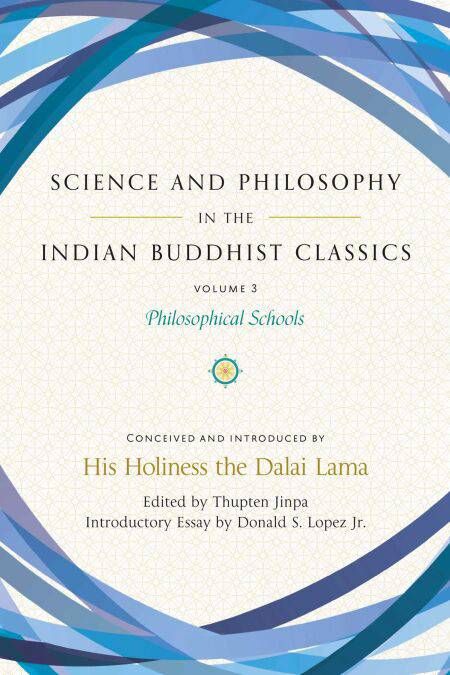
- Retrait gratuit dans votre magasin Club
- 7.000.000 titres dans notre catalogue
- Payer en toute sécurité
- Toujours un magasin près de chez vous
- Retrait gratuit dans votre magasin Club
- 7.000.0000 titres dans notre catalogue
- Payer en toute sécurité
- Toujours un magasin près de chez vous
Science and Philosophy in the Indian Buddhist Classics, Vol. 3 EBOOK
Philosophical Schools
Ebook | Anglais
22,36 €
+ 22 points
Format
Description
Deepen your understanding of meaning and truth with the third volume of the Dalai Lama’s esteemed series Science and Philosophy in the Indian Buddhist Classics.
Science and Philosophy in the Indian Buddhist Classics compiles classical Buddhist explorations of the nature of the material world, the human mind, reason, and liberation, and puts them into context for the modern reader. This ambitious four-volume series—a major resource for the history of ideas and especially the history of science and philosophy—has been conceived by and compiled under the visionary supervision of His Holiness the Dalai Lama himself. It is his view that the exploratory thinking of the great masters of classical India still has much that is of interest to us today, whether we are Buddhist or not. These volumes make those insights accessible.
In this third volume the focus turns to exploring the philosophical schools of India. The practice of presenting the views of various schools of philosophy dates back to the first millennium in India, when proponents of competing traditions would arrange the diverse sets of philosophical positions in a hierarchy culminating in their own school’s superior tenets. Centuries later, relying on the Indian Buddhist treatises, Tibet developed its own tradition of works on tenets (grub mtha’), often centered on the four schools of Buddhist philosophy, using them to demonstrate the philosophical evolution within their own tradition, and within individual practitioners, as they progressed through increasingly more subtle expressions of the true reality.
The present work follows in this venerable tradition, but with a modern twist. Like its predecessors, it presents the views of seven non-Buddhist schools, those of the Samkhya, Vaisesika, Nyaya, Mimamsa, Vedanta, Jaina, and Lokayata, followed by the Buddhist Vaibhasika, Sautrantika, Cittamatra, and Madhyamaka schools, arranging them like steps on a ladder to the profound. But rather than following in the sharply polemical approach of its ancient predecessors, it strives to survey each tradition authentically, relying on and citing the texts sacred to each, allowing the different traditions to speak for themselves. What, it asks, are the basic components of the world we experience? What is the nature of their ultimate reality? And how can we come to experience that for ourselves? See how the rich spiritual traditions of India approached these key questions, where they agreed, and how they evolved through dialogue and debate.
This presentation of philosophical schools is introduced by His Holiness and is accompanied by an extensive introduction and survey by Professor Donald Lopez Jr. of the University of Michigan, who is uniquely qualified to communicate the scope and significance of this literary and spiritual heritage to modern readers.
Science and Philosophy in the Indian Buddhist Classics compiles classical Buddhist explorations of the nature of the material world, the human mind, reason, and liberation, and puts them into context for the modern reader. This ambitious four-volume series—a major resource for the history of ideas and especially the history of science and philosophy—has been conceived by and compiled under the visionary supervision of His Holiness the Dalai Lama himself. It is his view that the exploratory thinking of the great masters of classical India still has much that is of interest to us today, whether we are Buddhist or not. These volumes make those insights accessible.
In this third volume the focus turns to exploring the philosophical schools of India. The practice of presenting the views of various schools of philosophy dates back to the first millennium in India, when proponents of competing traditions would arrange the diverse sets of philosophical positions in a hierarchy culminating in their own school’s superior tenets. Centuries later, relying on the Indian Buddhist treatises, Tibet developed its own tradition of works on tenets (grub mtha’), often centered on the four schools of Buddhist philosophy, using them to demonstrate the philosophical evolution within their own tradition, and within individual practitioners, as they progressed through increasingly more subtle expressions of the true reality.
The present work follows in this venerable tradition, but with a modern twist. Like its predecessors, it presents the views of seven non-Buddhist schools, those of the Samkhya, Vaisesika, Nyaya, Mimamsa, Vedanta, Jaina, and Lokayata, followed by the Buddhist Vaibhasika, Sautrantika, Cittamatra, and Madhyamaka schools, arranging them like steps on a ladder to the profound. But rather than following in the sharply polemical approach of its ancient predecessors, it strives to survey each tradition authentically, relying on and citing the texts sacred to each, allowing the different traditions to speak for themselves. What, it asks, are the basic components of the world we experience? What is the nature of their ultimate reality? And how can we come to experience that for ourselves? See how the rich spiritual traditions of India approached these key questions, where they agreed, and how they evolved through dialogue and debate.
This presentation of philosophical schools is introduced by His Holiness and is accompanied by an extensive introduction and survey by Professor Donald Lopez Jr. of the University of Michigan, who is uniquely qualified to communicate the scope and significance of this literary and spiritual heritage to modern readers.
Spécifications
Parties prenantes
- Traducteur(s):
- Editeur:
Contenu
- Nombre de pages :
- 536
- Langue:
- Anglais
Caractéristiques
- EAN:
- 9781614298137
- Date de parution :
- 12-12-22
- Format:
- Ebook
- Protection digitale:
- Adobe DRM
- Format numérique:
- ePub

Les avis
Nous publions uniquement les avis qui respectent les conditions requises. Consultez nos conditions pour les avis.





